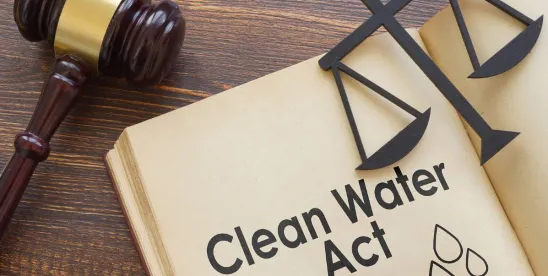Update: On June 30, 2025, the U.S. Supreme Court denied certiorari Port of Tacoma v. Puget Soundkeeper Alliance, No. 24-350. The Court often gives considerable weight to the Solicitor General’s views, but the Solicitor General’s amicus brief supporting certiorari failed to sway the Court. The Court generally does not explain cert denials, and there were no opinions issued relating to the case, but the Court often waits to resolve circuit splits until more courts of appeals have had the opportunity to consider an issue. The Court denying certiorari allows for the non-uniform enforcement of the Clean Water Act (CWA) and the potential deepening of the circuit split as the issue is litigated in future cases. Though the Court denied certiorari on the issue as presented in this case, the Solicitor General’s views will be relevant to future cases with similar issues, and we expect defendants to press this issue in future citizen suits and to cite to the Solicitor General’s filing in this case.
Key Takeaways
- Federal citizen suits are likely to become more frequent as the federal government decreases its enforcement efforts. Federal courts are split on whether Clean Water Act (CWA) citizen suits can enforce permit terms that implement only state law. The Solicitor General has now weighed in on that issue at the Supreme Court’s request, arguing that the Court should grant certiorari and that such suits are not permissible.
- The case, Port of Tacoma v. Puget Soundkeeper Alliance, is potentially very significant. Whether or not the Court grants certiorari on the issue now, the Solicitor General’s views will be relevant to the scope of remedies under the CWA.
The Solicitor General Favors Granting Review
Last week, the Solicitor General weighed in on a pending petition for a writ of certiorari in Port of Tacoma v. Puget Soundkeeper Alliance, No. 24-350. The issue is whether Section 1365 of the CWA authorizes federal enforcement of provisions in a state-issued National Pollutant Discharge Elimination System (NPDES) permit that imposes broader obligations than those required under the federal CWA. The CWA gives states the authority to run the NPDES permitting program for discharges into navigable waters. State-issued permits must ensure compliance with federal requirements but may also include requirements that are “more stringent” or of a “greater scope” than the federal requirements.
The issue is an important one that has divided the Courts of Appeals. The Ninth Circuit ruled that CWA citizen suits can be a tool for enforcing the entirety of a state-issued NPDES permit, including conditions that mandate a broader scope of coverage than the federal requirements in the Act. Puget Soundkeeper Alliance v. Port of Tacoma, No. 21-35881 (9th Cir. 2024). As pointed out by the Solicitor General, the Fourth Circuit and Eleventh Circuits have both signaled that they may adopt the Ninth Circuit’s interpretation. By contrast, the Second Circuit, in Atlantic States Legal Found., Inc. v. Eastman Kodak Co., 12 F.3d 353 (2d Cir. 1993), disallowed citizen suit enforcement for state permit requirements of a “greater scope” than what federal law requires.
The Solicitor General urged the U.S. Supreme Court to grant certiorari, adding to the likelihood of a grant of certiorari. Below, Judge O’Scannlain wrote a special concurrence effectively crying out for Supreme Court review by highlighting the circuit split and flaws in the Ninth Circuit’s interpretation of the Act. The Port of Tacoma also received robust amicus support that, in conjunction with the Solicitor General’s argument in favor of review, could secure this case on the Court’s merits docket.
“More Stringent” vs. “Greater Scope”
The Solicitor General’s filing distinguishes between state requirements that are “more stringent” and those of a “greater scope” than what the CWA requires. A “more stringent” state standard involves a stricter version of a federal requirement, such as a lower effluent limit for a discharge that the Act already regulates. A state requirement that is broader in scope than the federal requirements involves state-imposed restrictions for discharges that the Act does not otherwise regulate. This can include, for example, a state’s decision to regulate sources that are not subject to permitting requirements under the Act, such as in Port of Tacoma.
All parties agree that “more stringent” standards are considered part of the federally-approved NPDES program and are enforceable through citizen suits. The Solicitor General’s brief concludes that this rule does not extend to permit provisions with a “greater scope” than what the CWA requires. The brief explains that the federal government cannot enforce these exclusively state-law provisions and that allowing private citizens broader enforcement authority than the federal government would subvert the intended supplemental nature of CWA citizen suits. The brief argues that such a grant of enforcement authority would raise concerns under Article II of the Constitution, making this interpretation disfavored under constitutional avoidance principles. The brief also presents a textualist analysis of the key statutory provisions, relying on a long-standing U.S. Environmental Protection Agency (EPA) regulation, 40 C.F.R. 123.1(i)(2).
The Impact of Loper Bright
The Second Circuit’s Atlantic States decision relied in part upon the same EPA regulation that the Solicitor General now cites, 40 C.F.R. 123.1(i)(2), which clarifies that broader state-law components of the permit are not part of the federal program. The respondents argue that the Second Circuit’s reliance on the EPA regulation during the Chevron era weakens the Second Circuit precedent and reduces the need for the Court to grant certiorari. The Solicitor General addresses this point by arguing that the Second Circuit gave Chevron deference on a separate issue and not the scope of citizen suit enforcement. Further, the Solicitor General argues that a “proper reading” of the citizen suit provision would result in the same interpretation that the Second Circuit reached.
Yet Another CWA Case Before the Court?
The Court often gives considerable weight to the Solicitor General’s views, so the brief may signal that the Court will hear a CWA case for the second consecutive term. In March, the Court held in City & County of San Francisco v. EPA, 145 S. Ct. 704 (2025), that EPA exceeded its statutory authority when it included “end-result” provisions that hold permittees liable for the quality of the receiving water in NPDES permits. If the Court grants certiorari in Port of Tacoma, it would have another opportunity to address the scope of the statute. Even if the Court does not grant certiorari on the issue now, the Solicitor General’s analysis is likely to be of great interest to federal courts considering pending and future CWA citizen suits.
Kirsten Flinn contributed to this article





 />i
/>i

